JICA Satellite Sessions During the 8th Global Symposium on Health Systems Research 2024 (HSR2024) (Part 2)
2025.02.26
From Nov. 18 to 22, 2024, the 8th Global Symposium on Health Systems Research 2024 (HSR2024), a prestigious global health event, was held for the first time in Nagasaki, Japan.
Prior to the main sessions, satellite sessions took place on November 18 and 19, and JICA organized eight of these. An overview of the satellite sessions that took place on November 19 is provided below. Video recordings from Sessions 6 and 7 can be viewed as well.
(Click here to view the report on the satellite sessions that took place on November 18.)
Based on experience from official development assistance loan projects by JICA to achieve universal health coverage (UHC), policymakers and researchers were invited from different countries to discuss efforts on health financing for UHC. Representatives of the Ministry of Family and Solidarity of Senegal, the Ministry of Health of Kenya and the Universal Health Insurance Authority of Egypt gave presentations on the following topics respectively: budget increase to provide health insurance coverage to those who are in poverty or are vulnerable, realized in Senegal through JICA projects; ongoing health sector reform in Kenya; and Egypt’s policy for UHC.
Meanwhile, the Ministry of Finance and Budget of Senegal shared its perspectives. For example, to secure increased budget allocation to a ministry, it is effective when the ministry or agency in charge presents its achievements. Professor Nakamura Ryota, Hitotsubashi University, then reported on the outcome of impact evaluation that was jointly conducted by JICA and Hitotsubashi University on the project for UHC in Senegal. Professor Nakamura pointed out that although a drop in household health expenditure is being observed, the challenge of budget shortage for health insurance schemes exists. Togawa Shotaro, JICA, presented the results of an analysis of the process to formulate a plan for health-financing development in Senegal. Togawa pointed out the importance of strengthening systems for collaboration for plan execution as well as assistance from development partners who take political and economic context into account.
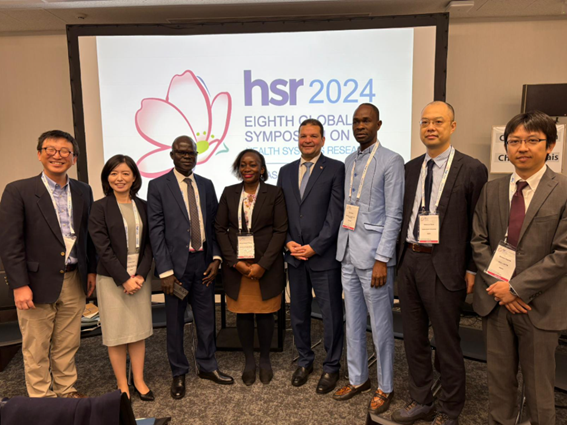
Video recording of Session 6:
English
French
In addition, Togawa gave a poster presentation titled “Political economy analysis of multi-stakeholder collaboration in the process of formulating a new universal health coverage (UHC) policy in Senegal: Recommendations for a successful reform.” He reported on the outcome of the analysis of how domestic and international stakeholders are collaborating for health-financing reform in Senegal, in particular, to formulate a new strategy for universal health insurance coverage. Togawa is conducting this research with assistance from the JICA Ogata Sadako Research Institute for Peace and Development (JICA Ogata Research Institute). He provided explanation and engaged in discussions with visitors in the presence of Senegalese government officials who had visited Japan for the satellite session. The presentation drew a lot of attention.
Poster presentation “Political economy analysis of multi-stakeholder collaboration in the process of formulating a new universal health coverage (UHC) policy in Senegal: Recommendations for a successful reform”
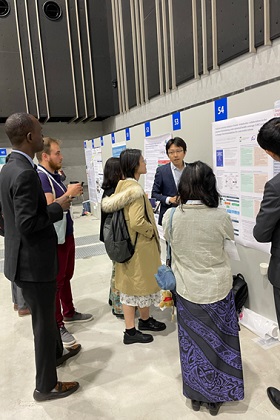
Low- and middle-income countries (LMICs) face the “double burden” of communicable and non-communicable diseases. Within the next decade, 75% of cancer deaths are projected to occur in LMICs. However, efforts to strengthen health systems in resource-constrained countries to deal with cancer have not been sufficient.
In this session, Takizawa Ikuo, Principal Research Fellow from the JICA Ogata Research Institute served as a moderator. Ida Akiko, Research Fellow, also from the JICA Ogata Research Institute, led the presentations highlighting the tremendous lack of cancer care and necessary data for policymaking in LMICs, based on her ongoing research project "The Socio-Economic Impact and Challenges of Non-Communicable Diseases in Low- and Middle-Income Countries."
Professor Sonia Kabore, a pediatric oncologist from the University Pediatric Hospital of Charles de Gaulle, and Dr. Samiratou Ouédraogo of the University of Ouagadougou, a principal co-investigator of the O.R. Tambo Africa Research Chair in Burkina Faso, a West African country in conflict and struggling with poverty. They pointed out the lack of resources as a major challenge but also shared their optimism from seeing collaboration efforts among partners and the development of local resources. Dr. Chika Kitajima, Asia Regional Director of the Foundation City Cancer Challenge in Switzerland, presented the potential of a city-focused cancer control ecosystem model. Dr. Catherine Lam, Director of the Health Systems Unit and Asia Pacific Regional Program at St. Jude Children's Research Hospital, a world-renowned clinical research institute, shared her experience of improving childhood cancer care through strengthening health systems.
Furthermore, presenters shared international policy frameworks led by WHO, and successful examples liaising with governments, health professionals, academic researchers, the private sector, and community-based organizations. The session was concluded by pointing out that the early investment in cancer control yields greater returns, and that efforts to improve cancer control can contribute to more inclusive, integrative, and resilient health systems.
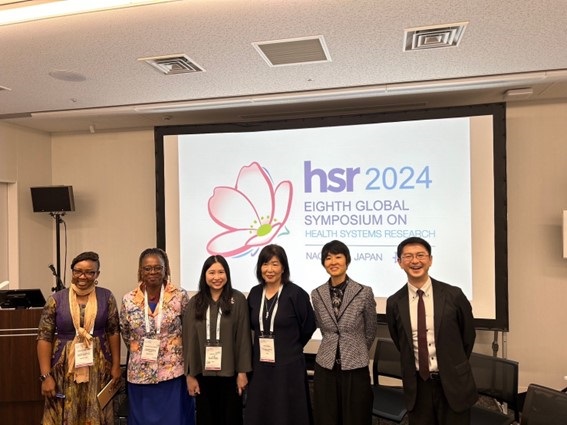
Ida also gave a poster presentation titled “Health Systems Strengthening to Counter Non-communicable Diseases in Resource-constrained and Conflict Settings: A Case of Childhood Cancer Care in Burkina Faso.” Ida made this poster jointly with the following: Professor Fla Kouéta, Yalgado Ouedraogo University Hospital; Professors Sonia Kaboret and Isso Ouédraogo, Charles de Gaulle Pediatric University Hospital; and Olivia Ouédraogo, Ministry of Health and Public Hygiene, Burkina Faso.
Cases of noncommunicable diseases continue to rise in Africa. As one case study to understand noncommunicable-disease control from the perspective of strengthening health systems, accessibility to childhood cancer care and social factors that inhibit it in Burkina Faso were analyzed and the results were shared in this poster presentation. Although childhood cancer has a survival rate of over 80% when discovered and treated at an early stage, it progresses quickly and a delay in the start of treatment can be fatal. Interviews with parents and guardians of childhood cancer patients, along with statistics from hospitals, showed that the time taken between symptom discovery and diagnosis was long, with a median of approximately 18 weeks. In particular, the time taken from symptom discovery to visiting a healthcare facility was shown to be approximately two times longer than for tuberculosis. Ida noted that the following are some of the underlying causes: childhood cancer is not well known among both the general public and medical professionals working at peripheral healthcare facilities; traditional medicine is prioritized over modern medicine; poverty; hospitals tend to be far; and it takes time before medical test results come out. Questions and comments came from a wide range of stakeholders, including working-level officers and researchers from Africa.
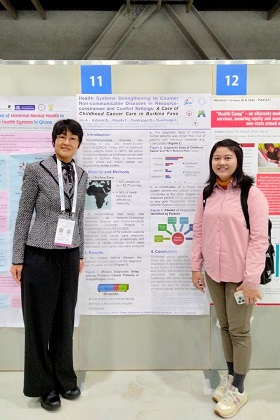
Ida Akiko, Research Fellow, JICA Ogata Research Institute (left), with a conference participant in front of her research presentation
Video recording of Session 7:
English
French
The enhancement of research capacity in Sub-Saharan Africa holds prominent roles in addressing the global challenges of communicable diseases. However, research institutes in this region face many challenges, such as limited national budget allocation, overseas outflow of researchers, dependency on external funding and the lack of ownership of research work caused by this. The mission of Kenya Medical Research Institute (KEMRI) is to make policy recommendations for national and regional healthcare using research-based evidence. With JICA’s technical cooperation, in addition to capacity building of the researchers themselves, KEMRI focused on the importance of effective and strategic management to be able to secure more research funding such as external competitive grants and to allow the effective use of resources to produce research achievements. They then created a plan to establish a new department in charge of strategic research management and administration.
In this session, evidence for this plan, status of efforts made so far, challenges and how they will be addressed were explained. In addition, the importance of setting key performance indicators (KPIs) to measure progress and the possibility of long-term collaboration with other organizations were discussed. Implementation of the plan and human capacity building will lead to improved efficiency and effectiveness of processes taking place before and after acquiring competitive research grants. This will lead to enhanced research capacity of the researchers and the organization, ultimately leading to research achievements for improved health among the general public.
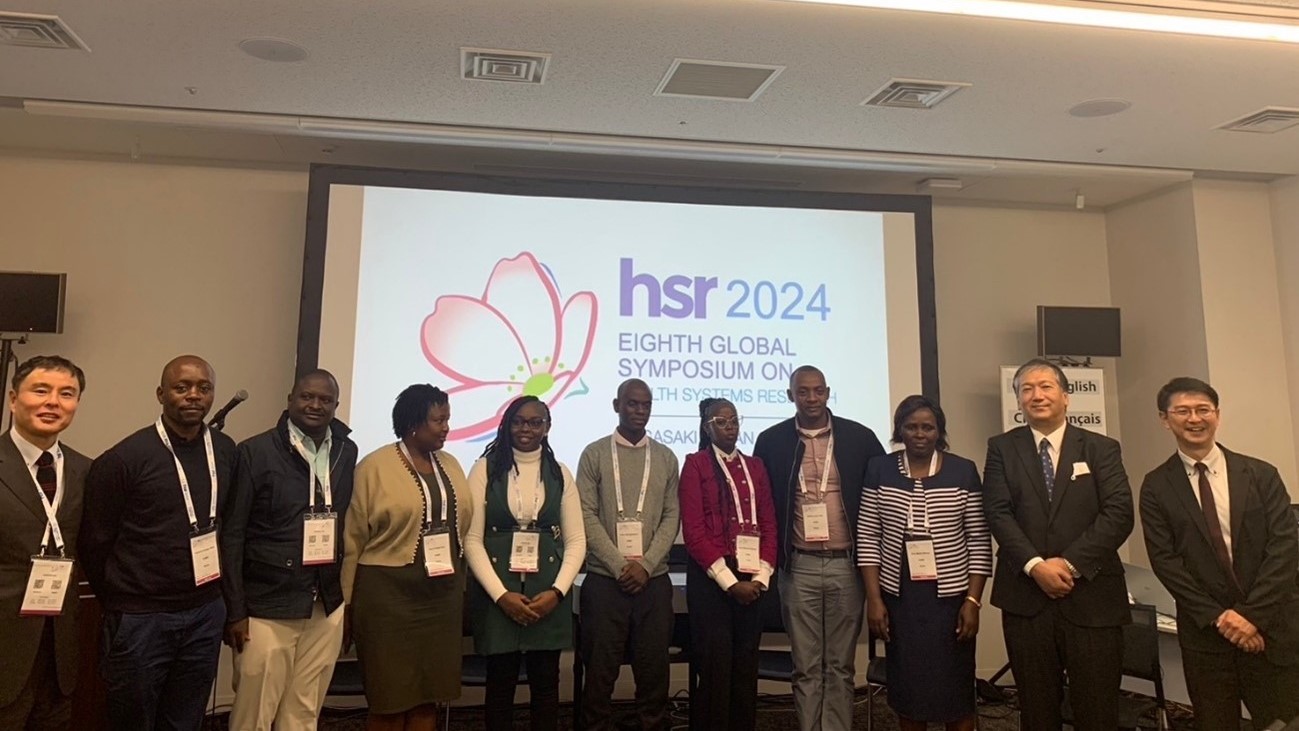
For more information on the speakers in each session, please see the event outline page provided below:
JICA Satellite Sessions in HSR2024 (Day 2) - JICA Ogata Research Institute

事業事前評価表(地球規模課題対応国際科学技術協力(SATREPS)).国際協力機構 地球環境部 . 防災第一チーム. 1.案件名.国 名: フィリピン共和国.

事業事前評価表(地球規模課題対応国際科学技術協力(SATREPS)).国際協力機構 地球環境部 . 防災第一チーム. 1.案件名.国 名: フィリピン共和国.

事業事前評価表(地球規模課題対応国際科学技術協力(SATREPS)).国際協力機構 地球環境部 . 防災第一チーム. 1.案件名.国 名: フィリピン共和国.

事業事前評価表(地球規模課題対応国際科学技術協力(SATREPS)).国際協力機構 地球環境部 . 防災第一チーム. 1.案件名.国 名: フィリピン共和国.

事業事前評価表(地球規模課題対応国際科学技術協力(SATREPS)).国際協力機構 地球環境部 . 防災第一チーム. 1.案件名.国 名: フィリピン共和国.
scroll